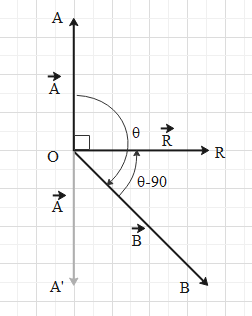Question
Question: The resultant of two vectors A and B is perpendicular to the vector A and its magnitude is equal to ...
The resultant of two vectors A and B is perpendicular to the vector A and its magnitude is equal to half the magnitude of B. What is the angle between A and B?
Solution
- Hint: Use vector law R=A+B, where R is the resultant vector of the vectors A and B. R2=A2+B2+2ABcos(θ), where R, A, B are the magnitudes of the vectors and θ is the angle between A and B.
Complete step-by-step solution -
The given case can be shown as:

Vector OA is perpendicular to vector OR and OA’ is a vector equal in magnitude with OA but opposite in direction of OA.
Here, A+B=R ………..(i). But we can also write it as R+(−A)=B …………(1)
Let magnitude of vector OA be ‘a’, magnitude of vector OB be ‘b’, magnitude of vector OR be ‘r’ and since vector OA’ is equal in magnitude with OA, magnitude of vector OA’ will be ‘a’.
Now, by using the resultant formula for (1) we get, B2=A2+R2+2ARcos(θ).
⇒b2=a2+r2+2arcos(90∘) .………(2)
But, it is said that the magnitude of vector OR is half of the magnitude of vector OB. Therefore, r=21b⇒2r=b ……….(3). Substitute this value of b in (2).
So, we get,
⇒(2r)2=a2+r2+0 (Since cos(90) = 0).
⇒3r2=a2 .……….(4)
Now, use the resultant formula for (i).
Therefore, r2=a2+b2+2abcosθ ……….(ii). Substitute the values of a and b from equations (4) and (3) respectively in equation (ii).
⇒r2=3r2+(2r)2+23r2.2rcosθ
Now, solve for theta.
⇒1=3+4+23cosθ
⇒cosθ=−23
Since the value is negative, the angle will be an obtuse angle and the value that angle will equal to 180 - 30 = 150. Therefore, the angle between the vectors A and B is 150o.
Note: The problem can also be solved by resolving the vector B. If you complete the triangle ROB, you will get a right-angled triangle with OB as the hypotenuse. Now, use the trigonometric ratio, cos.
Therefore,
cos(θ−90)=br⇒r=bcos(θ−90) But we also know that r=21b.
⇒21b=bcos(θ−90)
⇒21=cos(θ−90)
⇒θ−90=60⇒θ=150o
Therefore, the angle between the vectors A and B is 150o.
